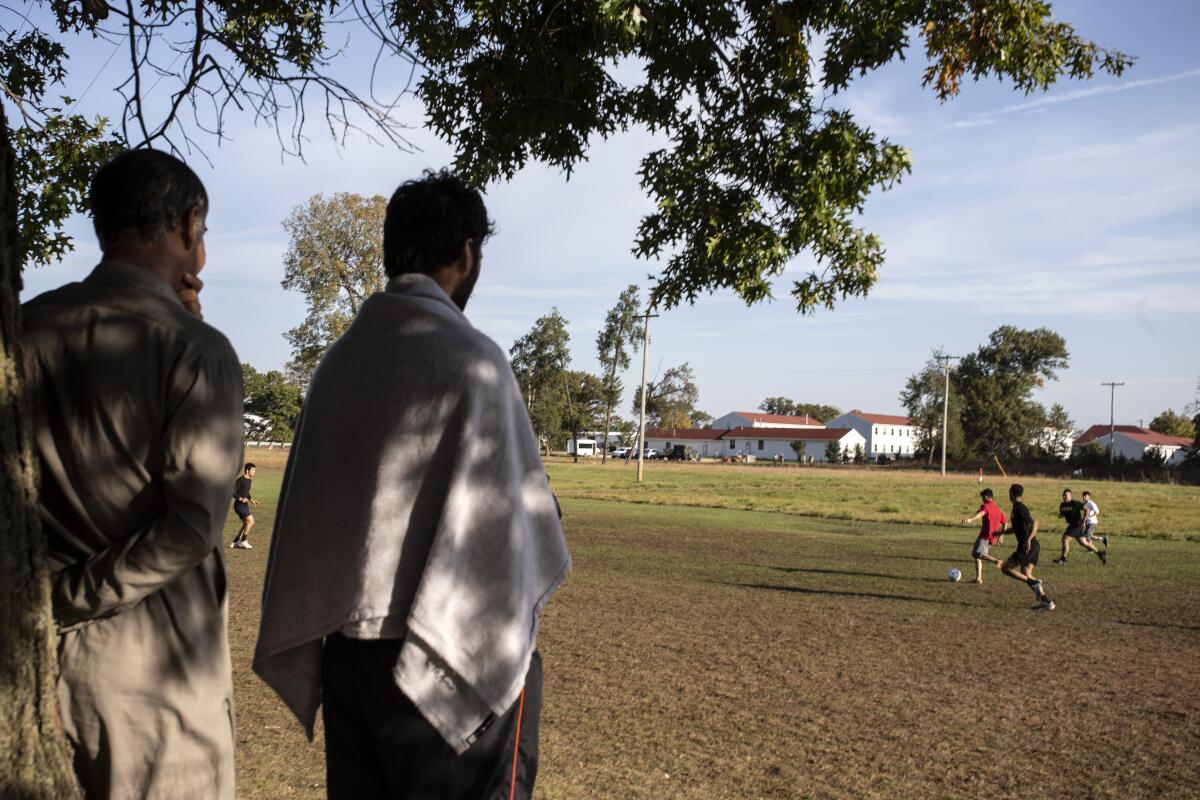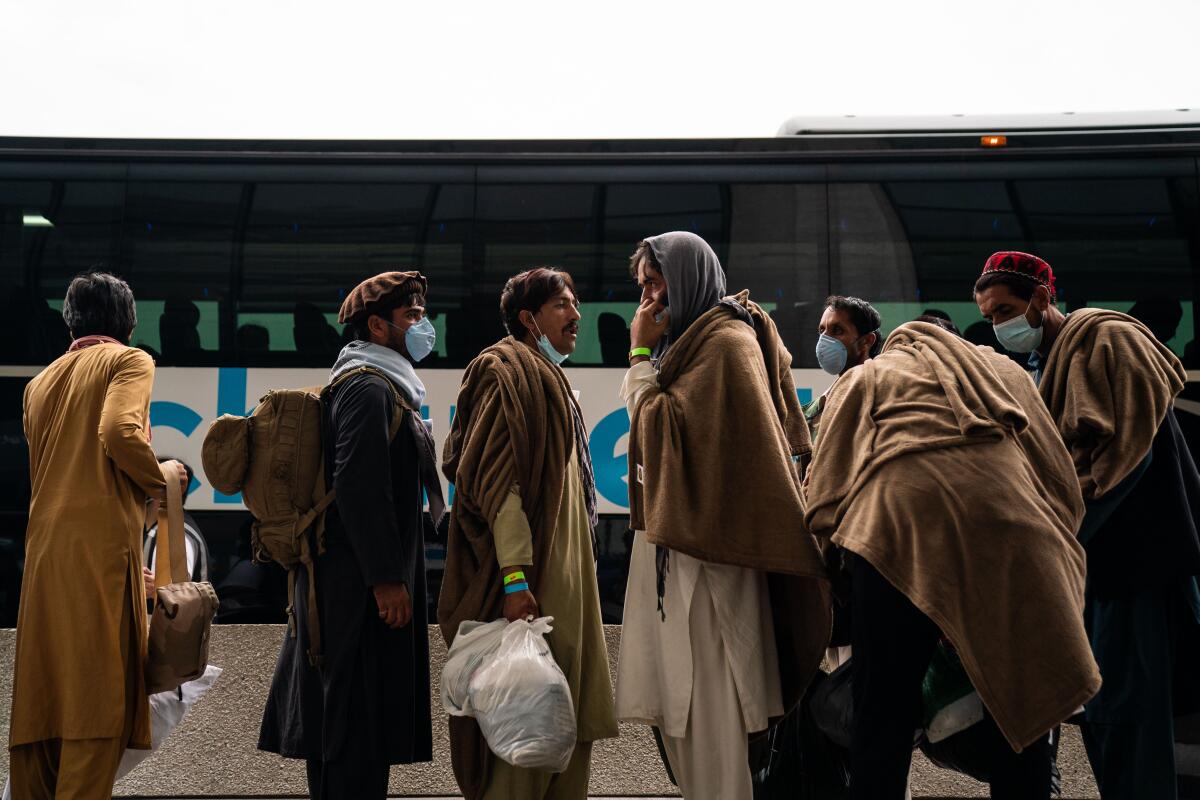Months after Taliban takeover, Afghan refugee children are schooled in Orange County hotel rooms

- Share via
Once the Taliban retook Afghanistan over the summer, Ismailkhail knew that he had to get his family out of the country.
Ismailkhail, his wife and seven children would be targets for the radical fundamentalist group since he was an Afghan soldier who worked with the United States government before it ended its two decade occupation in Afghanistan. Ismailkhail was eventually relocated to Orange County a few months ago by the U.S. government, but three of his children were not allowed to travel with him.
The three left behind in Afghanistan, ages 10, 12 and 14, have been moving among the different provinces to avoid Taliban detection.
“We were told to just go into the airport with the number of family members we currently have, and the remaining will be held later on to come to the U.S.,” Ismailkhail said through a translator during a phone interview on Wednesday.
Ismailkhail asked TimesOC to only identify him by his last name to keep his family safe from Taliban reprisal.

While Ismailkhail said he worries for his children in Afghanistan, his school-age children in Orange County are being taught what it’s like to be in a U.S. classroom by the Orange County Department of Education.
During the last few months of 2021, hundreds of Afghan refugees who fled the Taliban takeover were relocated to Orange County. They were among about 75,000 Afghans transferred to American cities by the U.S. government.
Christine Olmstead, the department’s chief academic officer, said the OCDE was notified in late December that the refugee families were struggling to find educational options in the county for their children. About six weeks ago, the department started providing the services in hotels where the refugee families are staying temporarily.
“These were all families who were working alongside our soldiers in Afghanistan,” Olmstead said. “The Taliban came through their town and terrorized them and blew up their schools and burned down their houses. They’re living with that trauma. We’ve heard stories of vans coming in the middle of the night and picking them up and putting them on C-17s to get them here.”
The department of education is providing these services until the families can be placed in housing by local agencies like Uplift Charity in Anaheim and the Orange County Social Services Agency. Olmstead said about half of the 60 students have already been connected with housing. Most of the families moved to homes outside of Orange County because local housing is too expensive.
The remaining students may be with the department for the next few months or the end of the school year. Olmstead said more refugees may be placed in Orange County, but it isn’t known whether that will happen or if there will be school-age children.
“The unique situation about this one was that this is the first time this many refugees have been placed in Orange County at one time,” Olmstead said. “Normally, it’s a couple families a year...So it created a unique situation for us to kind of meet the needs of the unique demand.”
The Afghan student program is part of the OCDE ACCESS division, where the department partners with local school districts to provide alternative educational options for students throughout the county, including schooling for incarcerated and at-risk youth and special education. The curriculum the Afghan children are being taught is called a “newcomer’s curriculum,” which helps the students learn basic communication skills in English to prepare them for being a student in a U.S. classroom, Olmstead said.

The department hired eight Farsi translators in order to communicate with the students. The classes are held for two hours a day, four days a week, and they tend to hold about 10 kids per class whose ages range from four to 18.
Once the students are transferred out of the Orange County program into a new school district, the department will notify the districts about the children because they qualify under the state’s McKinney-Vento Homeless Assistance Act, which aims to support housing insecure kids and their families.
“That’s what a newcomer program does, is just getting them to the point where they can transition into a comprehensive school and be able to communicate and understand what the teacher is saying,” Olmstead said.
Cara Pettite, who teaches in the department’s program, said she has found the work to be meaningful because the classes provide Afghan students with “tools to connect with other people.” She said that students have learned the differences in how classrooms operate in the U.S. when compared to their home country, such as not needing to stand up every time they address a teacher.
Pettite mentioned that the students also vary in their understanding of academic settings. Some come from higher socioeconomic areas where they received a formal education, while other students have no formal education. She has taught students how to use a computer and programs that are used in U.S. classrooms.
“So getting them into Google Classroom, showing them how to click on something, showing them how to use a mouse, showing them how to send an email — these are things they’ve never done,” Pettite said.
As the Russian invasion of Ukraine intensifies, Olmstead said the department has been asked whether it will provide the same services to Ukrainian refugees if they end up in Orange County.
“Our answer is yes,” she said. “If there’s a need, we will do this for them too.”
All the latest on Orange County from Orange County.
Get our free TimesOC newsletter.
You may occasionally receive promotional content from the Daily Pilot.






